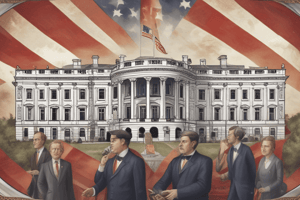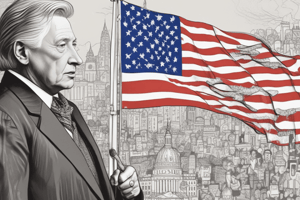Podcast
Questions and Answers
What effect did the job at the Ice House have on the narrator's life?
What effect did the job at the Ice House have on the narrator's life?
- It instilled a sense of confidence and a broader perspective. (correct)
- It introduced him to a new community.
- It allowed him to travel outside of Glen Allan.
- It provided financial security for his family.
What does the phrase 'the mark you make today will show up tomorrow' suggest?
What does the phrase 'the mark you make today will show up tomorrow' suggest?
- Immediate actions have no lasting consequences.
- Future outcomes are influenced by present actions. (correct)
- Short-term efforts are more important than long-term goals.
- Success comes without prior effort.
In what year does the story of the narrator's job at the Ice House begin?
In what year does the story of the narrator's job at the Ice House begin?
- 1958 (correct)
- 1965
- 1960
- 1955
How did the narrator perceive his hometown of Glen Allan?
How did the narrator perceive his hometown of Glen Allan?
What was a prominent feature of the narrator's early environment in Glen Allan?
What was a prominent feature of the narrator's early environment in Glen Allan?
What motivated Ma Ponk to raise her great nephew Clifton?
What motivated Ma Ponk to raise her great nephew Clifton?
How did Uncle Cleve view the importance of punctuality?
How did Uncle Cleve view the importance of punctuality?
What change did Clifton experience with his new job opportunity?
What change did Clifton experience with his new job opportunity?
What was a common practice for workers during hot summer months?
What was a common practice for workers during hot summer months?
What did Clifton experience on his first day working for Uncle Cleve?
What did Clifton experience on his first day working for Uncle Cleve?
What was the primary activity that the community performed for a living?
What was the primary activity that the community performed for a living?
How did Uncle Cleve's approach to life differ from others in the community?
How did Uncle Cleve's approach to life differ from others in the community?
What did the narrator initially feel about field work?
What did the narrator initially feel about field work?
What perception did the community have about Uncle Cleve's character?
What perception did the community have about Uncle Cleve's character?
What aspect of Uncle Cleve's daily routine highlighted his approach to life?
What aspect of Uncle Cleve's daily routine highlighted his approach to life?
What was Uncle Cleve's approach to his circumstances according to the passage?
What was Uncle Cleve's approach to his circumstances according to the passage?
What lesson did the narrator learn about education from Uncle Cleve?
What lesson did the narrator learn about education from Uncle Cleve?
Why did the narrator feel a sense of excitement about working for Uncle Cleve?
Why did the narrator feel a sense of excitement about working for Uncle Cleve?
What does the narrator suggest was a milestone in his life?
What does the narrator suggest was a milestone in his life?
How did Uncle Cleve view his customers and their importance?
How did Uncle Cleve view his customers and their importance?
What was the main lesson that Uncle Cleve taught about dealing with customers?
What was the main lesson that Uncle Cleve taught about dealing with customers?
What was Uncle Cleve's only advantage that contributed to his success?
What was Uncle Cleve's only advantage that contributed to his success?
What sentiment did Ma Ponk express regarding the narrator's journey to St. Louis?
What sentiment did Ma Ponk express regarding the narrator's journey to St. Louis?
What did the narrator trade for an internship position at the Ice House?
What did the narrator trade for an internship position at the Ice House?
What emotion did the narrator feel as he prepared to leave for St. Louis?
What emotion did the narrator feel as he prepared to leave for St. Louis?
Flashcards are hidden until you start studying
Study Notes
Clifton's Childhood
- Clifton was born in a small cotton community in Mississippi called Glen Allan where racial segregation was the norm.
- Clifton lived with various relatives and was raised by his great aunt, known as "Ma Ponk", who instilled in him the value of hard work.
- Clifton started working in the cotton fields at a young age, getting picked up each morning by Mr. Walter's field truck.
- Clifton describes working alongside other field hands: "We were on our way, packed together like sardines in a can, so close that our steaming breath intermingled in the cold morning air".
- The work was monotonous and physically demanding.
- Clifton felt that there was no opportunity for advancement in the cotton fields.
Uncle Cleve: A Man of Dreams
- Uncle Cleve, Ma Ponk's brother-in-law, owned an Ice House and offered Clifton a job opportunity; Uncle Cleve was known for his strictness and his commitment to being on time.
- Clifton remembers Uncle Cleve’s words: “Now hold on, boy!The work is hard.You gotta git up early.You gotta be on time!I know young ‘uns like you.You like to sleep late.I ain’t havin’ none of that.I’m telling you now, if you late, more than two times, you cain’t work for me.”
- Clifton was excited to work at the Ice House and was eager to prove himself to Uncle Cleve.
Observing Uncle Cleve: Lessons in Life
- Uncle Cleve stood out from the rest of the community, who mostly worked in the cotton fields, through his entrepreneurial spirit.
- Uncle Cleve owned an Ice House and other businesses despite the social restrictions of the time.
- Clifton admired Uncle Cleve's work ethic and his pride in his achievements.
- Uncle Cleve lived a life of self-reliance and focused on his own goals.
- Uncle Cleve's life became a role model for Clifton.
The Ice House: A Turning Point
- Clifton’s work at the Ice House gave him a new perspective on his life and the world around him.
- Clifton learned to expect more of himself by observing Uncle Cleve's work ethic, self-reliance, and respect for others.
- While working at the Ice House alongside Uncle Cleve, Clifton began to see that his own potential was unlimited.
- Clifton’s job at the Ice House inspired him to pursue his own dreams, including attending high school and graduating as valedictorian.
- Clifton worked hard at the Ice House, arriving on time and completing his tasks diligently.
- Uncle Cleve demanded much of Clifton: “Cliff, come on, boy!Them field trucks will be here anytime now.Go on and cut up at least five 50- pound blocks of ice.That’s what most of ‘em’ll git.It’ll last ‘em till noon.”
- Clifton's experiences working at the Ice House were transformative, shaping his perspective on hard work, self-reliance, and the importance of his own dreams.
Uncle Cleve's Mindset
- Uncle Cleve had little to no advantages
- Was not wealthy
- Did not have access to investors
- His formal education was likely limited to the 6th grade
- Despite these limitations, Uncle Cleve had a mindset that allowed him to become successful
- Uncle Cleve was an ordinary man whose only advantage was his mindset
The Author's Journey
- The author had limited opportunities growing up
- The author worked for Uncle Cleve at the Ice House
- The author was exposed to many aspects of the business besides just cutting ice
- This learning fueled his desire to be more than just an ice man
- After graduation in 1963, the author moved to St. Louis to continue what the Ice House experience had sparked
- The author was met at the Union Train Station by his birth father, whom the author had never met before
- The author's first days in St. Louis were tough
- His birth father had another family
- The author was virtually on his own
- He was not welcome to move in with his relatives
- The author's first job in St. Louis was washing pots and pans at a large downtown department store that had a big public cafeteria
- The job was 35 dollars a week
- The room was small, isolated, and filled with dirty pots and pans
- His co-workers never talked to him,
- He felt alone and isolated
- During these trying weeks, the author drew upon the lessons Uncle Cleve had taught him
- Uncle Cleve told the author “Gotta keep gittin’ book knowledge.Fill your head up.We didn’t have that opportunity.”
- The author continued to look for a new job while working at the cafeteria
- He often experienced rejections during the interview process
- The author was eventually hired by Jefferson Bank and Trust
- This came as a result of a job recruiter who recognized the author's potential
Entrepreneurial Mindset
- The ability to choose the way we respond to our individual circumstances is perhaps the single most powerful ability we have as human beings
- We all make assumptions about the world around us
- We make assumptions based on what we have been told and what we have observed
- We make assumptions about our own abilities and what we are capable of
- We want to succeed in life, but often make inaccurate assumptions about what it takes to succeed
- We presume that success requires us to possess rare talent or have access to money, power, and privilege
- Many successful entrepreneurs have come from difficult or adverse circumstances
- These successful entrepreneurs responded to their adverse circumstances differently which resulted in different outcomes
- We should use our adversity as motivation to propel us forward rather than as an excuse
- We should not engage in beliefs and behaviors that perpetuate our circumstances but instead, focus on the future and what we can control
Key Insights
- Entrepreneurs often face adversity and are, therefore, more motivated, resilient, and risk-tolerant.
- Entrepreneurship requires a shift in perspective from "what is" to "what if," focusing on solutions instead of dwelling on problems.
- Challenging assumptions and reexamining old ideas is essential for recognizing opportunities that others might miss.
- Entrepreneurs must be conscious of their decisions and willing to rethink old ideas and challenge their beliefs.
- The greatest barriers to success are often our own internal beliefs about ourselves and our capabilities.
- Our choices ultimately determine the outcome of our lives.
Choosing Your Path
- Following the crowd limits potential.
- Embracing conscious choices unlocks possibilities.
- Entrepreneurship requires a willingness to reinvent and re-imagine the world.
The Role of Assumptions
- Old assumptions often impede progress and limit our potential.
- Challenging assumptions can lead to new opportunities and untapped potential.
Key Lessons from Uncle Cleve
- It's not a lack of money, talent, or education that prevents success, but the choices we make.
- Circumstances don't determine our lives, but the choices we make do.
Studying That Suits You
Use AI to generate personalized quizzes and flashcards to suit your learning preferences.




